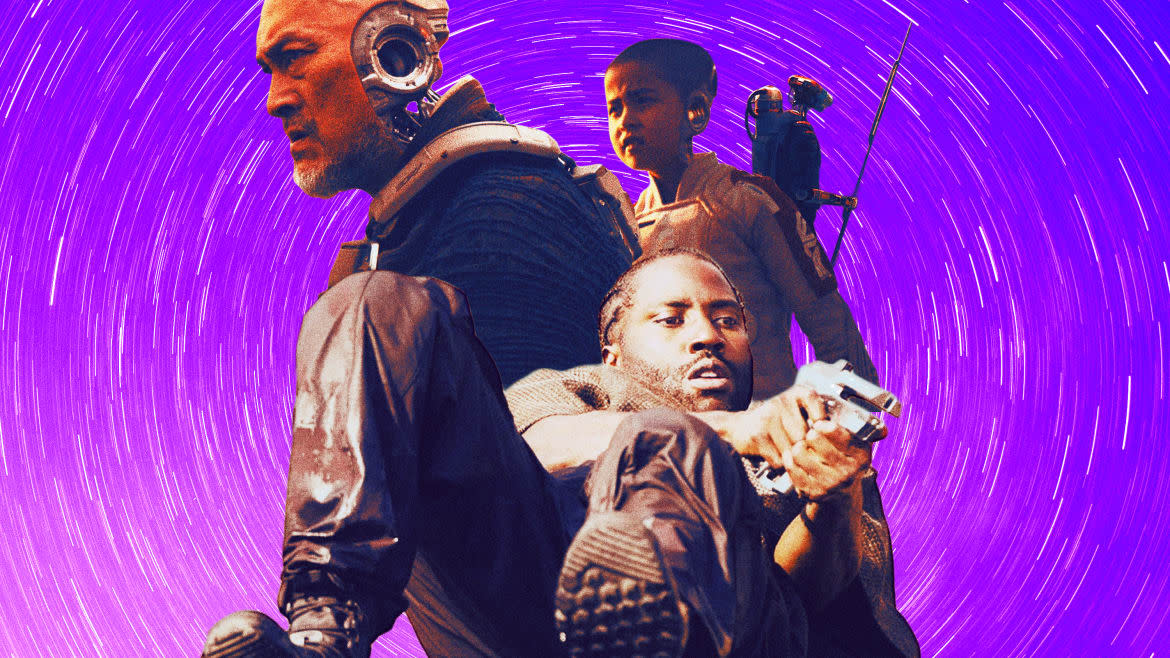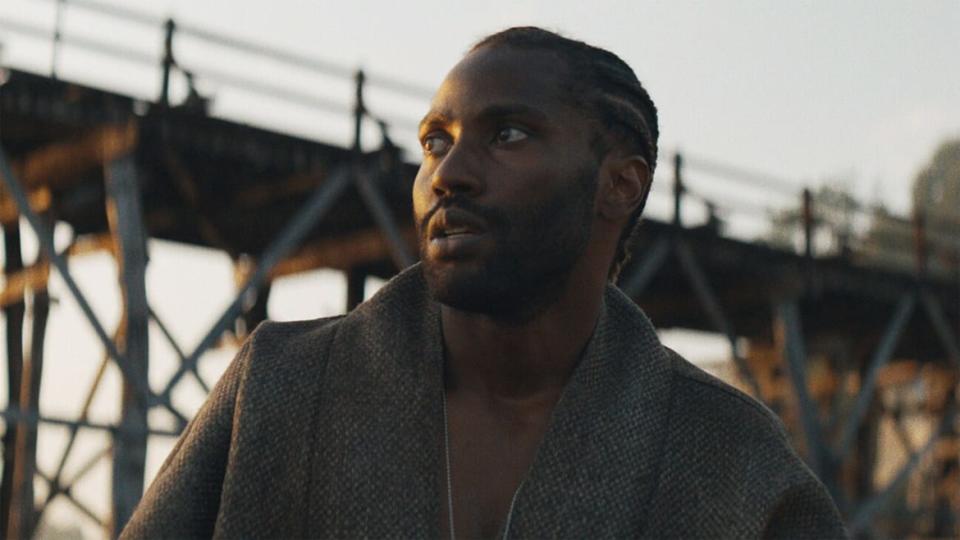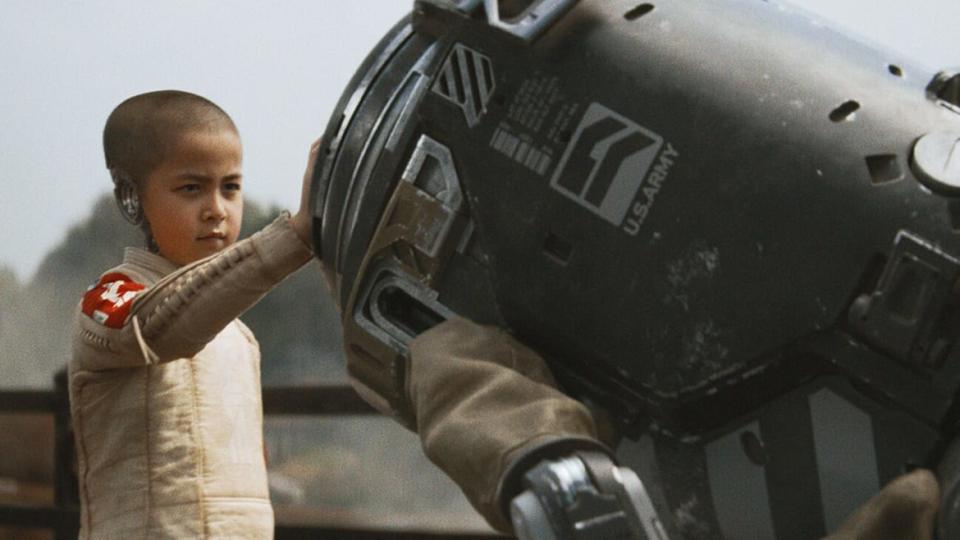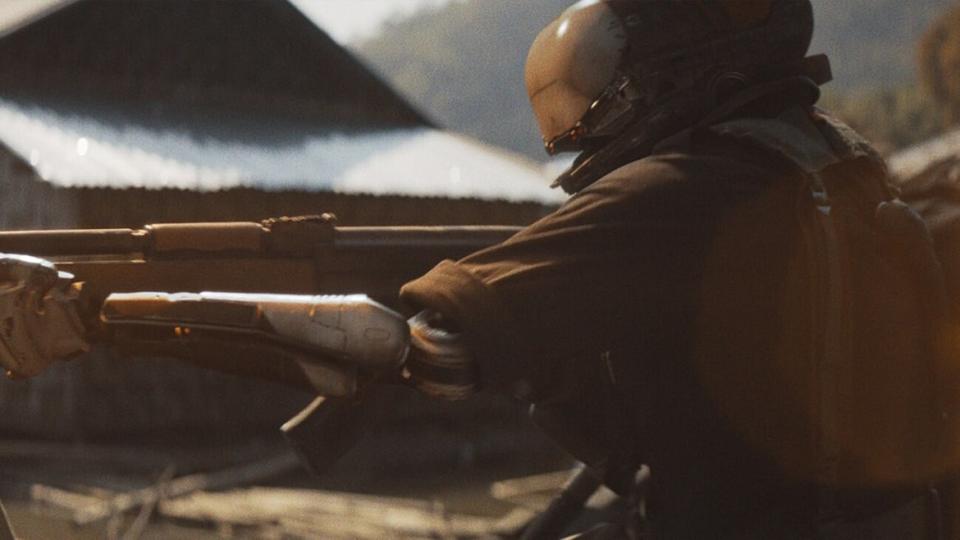‘The Creator’ Is So Sloppy It Makes the Case for Tired Franchise Films

- Oops!Something went wrong.Please try again later.
In an industry consumed with franchises, sequels, spin-offs, and other name-brand spectaculars, it’s admirable that Gareth Edwards has convinced a major studio—20th Century Studios—to produce an original stand-alone science-fiction epic. Good intentions, alas, pave the road to you-know-where, and that’s certainly the case with The Creator. A visually striking but shoddily written and crushingly derivative amalgam of assorted genre forefathers, the director’s follow-up to Rogue One: A Star Wars Story is so sloppy, corny, and unconvincing that it almost inadvertently makes the case for its rival IP-driven affairs.
The Creator (in theaters Sept. 29) provides a handy metaphor for itself via its signature sight of sentient robots with giant tube-shaped holes in their heads. Plotting is most definitely not the strong suit of Edwards and Chris Weitz’s script, which vacillates between borrowing and synthesizing bits and pieces of better movies, and establishing its scenario—and then staging scenes and incidents—with minimal lucidity and even less logic. At every other turn, a narrative development begs a question (or three) that goes unanswered, cast aside so the material can proceed along its urgent, preachy path. By its midway point, little of what’s taking place holds up to basic in-the-moment scrutiny, transforming the entire endeavor into merely a showcase for Edwards’ skill at orchestrating warfare-like action—something that itself proves somewhat limited here, as there isn’t a set piece in sight apt to get one’s blood pumping.
A concise newsreel prologue explains how mankind developed and became reliant upon ubiquitous artificial intelligence-powered robots, who served as society’s cooks, chauffeurs, and police officers. A nuclear attack in the heart of Los Angeles, however, permanently soured the United States’ relationship with their mecha-compatriots, and in 2065, the country is knee-deep in conflict with A.I. The primary battlefield is New Asia, an amorphous eastern region that’s embraced A.I. as the next phase of “evolution,” with one farmer claiming that the robots have “bigger hearts” than Yankee soldiers. It’s unclear how the machines developed consciousness or complex emotions; why they sleep, eat, and smoke; and why some of them walk about with human skin masks and others don’t (and, for that matter, why some resemble senior citizens and others, younger adults). What Edwards does make apparent is that the ’bots are basically the same as people in every conceivable way, as well as Earth’s new “other,” yearning for “freedom” and yet oppressed and persecuted by heartless warmongering Americans.
Edwards and Weitz’s tale is a quasi-Vietnam War saga that depicts robots as noble, loving, and selfless, and humanity, i.e., those from the USA, as malicious and murderous. Unfortunately, its A.I. characters aren’t interesting; they’re just valiant symbols—at least, when they’re not the butt of a joke, as happens when some autonomous cops are blown up and then walk about in headless, fritzing confusion. By striving to cast A.I. as its own “species,” The Creator concocts a binary us-vs.-them dynamic, and from the get-go, it’s wholly unpersuasive and, worse still, used as a vehicle for lame sermonizing.

Moreover, it’s not the least bit unique—something that can be said about the film’s every facet. Channeling Blade Runner, Terminator 2: Judgment Day, Children of Men, Avatar, Apocalypse Now, District 9, RoboCop, Total Recall, and approximately 20 additional ancestors, The Creator concerns Joshua (John David Washington), a special-forces soldier with a high-tech prosthetic arm and leg who suffers catastrophic loss while working undercover in New Asia to find the A.I. creator Nirmata. Thanks to a poorly planned raid, Joshua’s pregnant wife Maya (Gemma Chan) is killed and he fails in his mission. Years later, he’s persuaded to resume his tour of duty by evil military bigwigs Andrews (Ralph Ineson) and Howell (Allison Janney, sporting a blonde middle-school boy’s haircut) because they claim that Maya is actually alive. This time, his primary task is to locate a new weapon created by Nirmata, code-named Alpha One, that threatens to give A.I. the decisive advantage in the ongoing war.

When Joshua acquires Alpha One, it turns out to be a robo-child that loves cartoons and has the power to control all electrical devices. Joshua dubs the kid Alfie (Madeleine Yuna Voyles) and tries to use her to track down Maya, thus increasingly putting him at odds with his own kind. Regrettably, The Creator flops miserably in trying to develop a rapport between these two protagonists; Joshua is a one-note hero, Alfie is a cute blank, and their scenes together are exceedingly lifeless. Edwards assumes that Voyles is adorable enough to make not just Alfie but her entire robo-race sympathetic. The gamble, however, doesn’t pay off, leaving the film hurtling toward a pro-robot conclusion destined to fall on its melodramatic face.
The Creator is an inept hodgepodge uninterested in plumbing the potential moral and spiritual questions raised by artificial intelligence. Rather, it’s simply a transparent anti-intolerance Christ-child parable conceived with none of the nuances that might allow it to intriguingly resonate. It’s also a slapdash mess, epitomized by Ken Watanabe’s Harun, a Japanese robot rebel who appears and disappears at random, has vital intel that would end the war (but only tells it to Joshua), and receives a truly baffling climactic fate. Other than to exude an air of honorable gravity—and therefore embody A.I.’s superiority—there’s no reason for an actor of Watanabe’s caliber to assume such a pitifully underwritten role.

Embellishing its grand shot-on-location panoramas with CGI architectural structures, figures, and vehicles—including a spiffy aerial base called Nomad that uses a wall-of-light targeting system to drop bombs on its A.I. adversaries—Edwards’ latest can be stunning, and once in a blue moon, its aesthetic sense proves strong enough to compensate for its general dim-wittedness. For the most part, though, the director borrows his conceptual ideas from those who came before him, replete with law enforcement automatons that resemble the assembly-line offspring of Star Wars’ droids and Chappie’s title character. In terms of both form and content, and to the point of exasperation, the film devolves into semi-incoherence during a prolonged finale that vainly tries to pull at the heartstrings. For all its bathos, The Creator is a painfully mechanical creature. As one character says, “It’s not real—it’s programming.”
Did you like this review? Sign up to get our weekly See Skip newsletter every Tuesday and find out what new shows and movies are worth watching, and which aren’t.
Get the Daily Beast's biggest scoops and scandals delivered right to your inbox. Sign up now.
Stay informed and gain unlimited access to the Daily Beast's unmatched reporting. Subscribe now.

